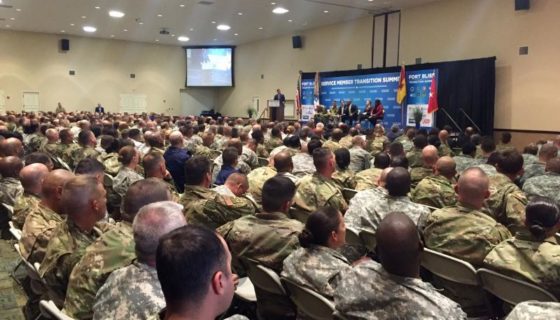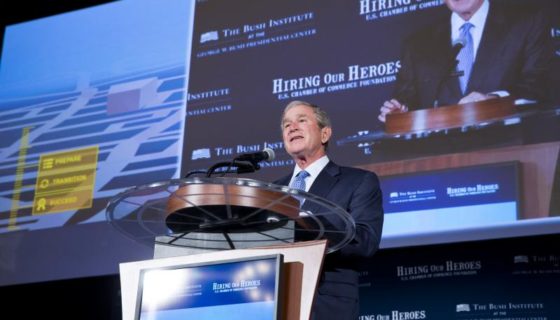The Power of LinkedIn and MSPN

Editor’s note: This article was written by Meredith Smith, a program manager for the Military Spouse Professional Network at Hiring Our Heroes. The Military Spouse Professional Network (MSPN) provides military spouses with career development and networking opportunities in military communities around the world. An integral part of Hiring Our Heroes’ Military Spouse Program, MSPN empowers military spouses at a grassroots level year-round.
If you’ve ever wondered about the power of Hiring Our Heroes’ Military Spouse Professional Network (MSPN) or the impact that LinkedIn can have on a military spouse’s career, or what can happen when these two resources are leveraged together, this is the story for you.
Amy Schwartz is like so many military spouses.
In 2015, Amy was a recent college graduate with a degree in human resources. She had just married her high school and college boyfriend, who himself had just commissioned in the Air Force, and they had both moved to San Antonio for his initial assignment.
Amy was proactive, applying for entry-level HR jobs in San Antonio five months before their move.
After applying to more than 50 jobs in San Antonio and using every professional and academic network connection she had, she still did not have a job offer when they moved to Texas in October.
Amy finally got an interview with her target company, USAA. But, surprisingly, it wasn’t a job application that landed her the interview. Earlier in Amy’s job search, she decided to purchase LinkedIn Premium to augment her own job search. As an HR professional, she knew the power of LinkedIn from a recruiting perspective. She immediately began to use the Inmail feature to strategically reach out to recruiters.
Several months before she moved to San Antonio, Amy had reached out to a recruiter with USAA. She didn’t get an immediate response, but when that recruiter did reach out, she had a solid lead. The recruiter thought Amy would be a good fit for a specific job opening.
Here’s the thing though — the job had never been externally posted.
Amy interviewed for the job at the end of October, was offered the job in November, and she started full-time with USAA at the beginning of January 2016.
Leveraging Her Network
When Amy’s husband received orders to move to Las Vegas at the end of 2016, she was again faced with the uncertainty of finding a new job. She knew it had taken five months to get a job offer the last time. She really didn’t know what to expect this time. It was daunting.
Upon moving to Las Vegas, Amy decided to leverage her network. She connected with her Key Spouse Mentor through the U.S. Air Force Key Spouse Program and asked her what resources were available for military spouses who were trying to maintain a career path alongside their service members. Her Key Spouse Mentor shared that her squadron had helped initiate the Nevada network of the Military Spouse Professional Network.
This is when Amy connected with me.
I was a Key Spouse in my husband’s squadron, and when the squadron commander’s spouse asked me what I thought we could do to better support military spouses, I said we were focusing more on supporting families with children, and perhaps unintentionally excluding career-oriented military spouses.
Given that culture is set at the squadron level, this has a direct impact on the overall retention in the Air Force right now. The commander’s spouse completely agreed, and said “How can I support you? We will start with whatever you think we should do in our squadron, and when it grows from there, we will be able to help even more people.”
As a result, I launched Nevada MSPN in May 2016. At our second meeting, we not only had spouses from other squadrons attend, we had spouses from another military base. I knew we were onto something.
When Amy called me in early January 2017 to find out about the “career group” I had launched in Las Vegas, I was surprised to see a Tennessee area code pop up. When I answered the phone, I was struck to be talking with a fellow University of Tennessee alumna, and surprised to learn all of the things we had in common.
We attended high school in neighboring counties. Both of our husbands played rugby for Tennessee. Neither one of us could believe that as sweet southern belles, we would end up in “Sin City.” The connections seemed endless.
After we got over our shared disbelief that we both now lived in the casino capital of the world, I told Amy about the upcoming MSPN meeting, which was going to be an industry sector spotlight. I was careful not to call it a “career fair “because I was sensitive (and still am) to how people understand MSPN’s role in the job search.
So, I shared with Amy that for the January meeting, we would have people representing various industries, and the goal was to network, build connections and learn about new and interesting industries. During our call, Amy confided that she was not at all interested in the gaming industry.
For that meeting, I invited people to represent the health care industry, K-12 education, higher education, retail, and … gaming. The person who I had invited to represent the gaming industry was an HR executive for a large company. She offered Amy an interview at that meeting.
After Amy’s initial interview, the HR executive asked Amy what she wanted to do. When Amy shared that her passion is executive leadership coaching, that HR executive ensured Amy was connected with the correct hiring manager, and they offered her a job as a leadership development coordinator. In this role, Amy was in charge of deploying multi-million dollar, CEO-driven, strategic leadership and culture initiatives for a company of 55,000 people.
And, yes, you read correctly. Her title was “coordinator.”
Cutting Her “Out-of-Work” Time in Half
Amy fully credits the MSPN for not only connecting her to this first opportunity in Las Vegas, but also for cutting her “out-of-work” time in half. From the time, Amy arrived in San Antonio to the time she started a job, she was out of work for five months. When she connected with the MSPN in Las Vegas immediately upon relocating to the area, the time she was out of work was two months.
Amy was promoted within three months, given two raises in the first year and one raise in the second year. She had doubled her income within two years, which she is quick to point out actually highlights how underemployed she was when she started out.
“Once I was able to spend time at a company and prove myself, I was able to overcome underemployment,” Amy said.
This is a critical piece of the story that in interviewing Amy she really wanted me to highlight:
Nevada MSPN coached her through every single raise and promotion and connected her to mentors in her industry who had the perspective of being just a few years her senior, and also being military spouses.
“I was able to overcome underemployment.”
Amy Schwartz
Amy asked for every single raise and promotion she got while in Las Vegas. She is also quick to say, though “If I didn’t get the raise or promotion the first time I asked, I would always follow-up.” She did that with the support of her network.
Building Her Professional Capital
During all of this career growth in salary and responsibility, Amy was also building her professional capital in other ways.
An avid LinkedIn user, Amy saw that a former USAA colleague was in Las Vegas for a conference. She sent him a message to see if they could connect while he was in town. After having lunch and sharing what she was working on related to executive leadership and coaching, the two agreed to stay in touch.
When that former colleague needed a keynote speaker the next year for the SHRM conference in Las Vegas, he called on Amy to give it.
If Amy had not been using LinkedIn, she would never have been given this opportunity to highlight her work and build her public speaking and presentation skills. Amy became the MSPN Nevada’s premier LinkedIn expert, and her sessions were always packed.
The Importance of Military Spouse Professional Network
Last year, Amy was offered a new job. This happened right before her husband unexpectedly got PCS orders to Cannon Air Force Base in New Mexico.
I remember when she called me to tell me — I could physically feel the frustration and confusion she was experiencing. She had taken the job because her husband had been told if he deployed, they would stay in Las Vegas. He was deployed when they found out he had been reassigned. I remember being angry for her.
But in my conversation with Amy leading up to writing this article, Amy didn’t even mention this. Instead she shared that “MSPN coached me through having the conversation about moving my role to a remote one.” The pitch worked, and Amy was not only transitioned to a remote role, but she was again promoted.
While I knew much of this story, interviewing Amy for this article only further reinforced for me the importance of MSPN and the benefit of effectively leveraging valuable resources, such as LinkedIn, that are so readily available to us as military spouses.
It’s also important to note that, while this is truly an incredible success story, there is and has been challenges in Amy’s career path. She is, however, such a shining example of what can happen if we choose grit over despair, and lean on our military spouse community to help us maintain our career trajectory.



